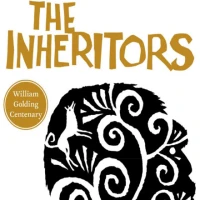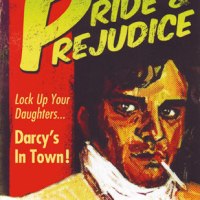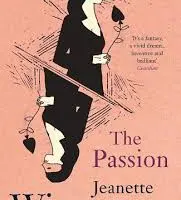With the Flow, by Joris-Karl Huysmans and translated by Andrew Brown
Guy Savage alerted me to Huysmans’ With the Flow. A bored clerk wanders the streets of Paris eating a series of dismal meals and generally having a miserable time. It’s a tremendous study of depression (melancholy) that somehow manages to be relentlessly glum and extremely funny at the same time.
The novella opens with M. Folantin taking a waiter’s recommendation as to which cheese is best. It’s the Roquefort, but when it comes Folantin is unsurprised to find that what’s on his plate appears to have been “cut out of a cake of Marseilles soap.”
He’s unsurprised because that’s how his life is. He’s a government clerk, but it’s not a job that pays well and his early hopes of rapid promotion have long since slumped. Folantin is intelligent and as a youth won scholastic prizes, but his family were poor and he is without connections. What place is there for him in this new Paris of wide boulevards in which the old neighbourhoods are being abolished?
Folantin eats his dinner, and drinks his wine that tastes of ink:
His feet frozen, squeezed into ankle boots that had started to warp in the deluge and the puddles, his cranium white-hot under the gas burner hissing over his head, M. Folantin had hardly touched his food, and even now his bad luck refused to let go of him; his fire faltered, his lamp grew sooty, his tobacco was damp and kept going out, staining the cigarette-paper with a stream of yellow juice.
Folantin is unmarried. He has no friends, because the friends he once had did marry, and as a bachelor he had less and less in common with them. He’s, well, not happy to be unmarried but he comforts himself that things would be even worse with a woman to support and to have to spend all his time with. He’s not a sociable sort. He doesn’t even use prostitutes anymore – his libido has flickered out. His only real human contact now is indifferent waiters and troublesome household staff:
… he had at least got rid of his housekeeper, Mme Chabanel, an old hag, six feet tall, with moustachioed lips and obscene eyes set into her face over her sagging jowls. She was a sort of camp-follower who ate like a horse and drank like a fish; she was a lousy cook, and over-familiar to an impossible degree. She would plonk the plates onto the table any old how, then sit down opposite her master, hoist up her skirts and chatter away, laughing and joking, her bonnet askew and her hands on her hips.
It was pointless to expect her to serve him properly; but M. Folantin would perhaps have put up with even this humiliating lack of ceremony, if the amazing old girl hadn’t stripped him of his possessions like a highway robber; flannel waistcoats and socks would vanish, old shoes would go missing, spirits would evaporate into thin air, and event he matches seemed to light themselves.
…
Widow Chabanel had been replaced by the concierge, who pummelled the bedclothes into shape with his fists, and made pets of the spiders, whose webs he looked after.
Huysmans loves his comic servants, but he does do them very well.
Folantin’s problem is money. He has just enough to support himself, but not enough to live at all well. He regularly changes restaurant hoping to find one he can afford which has halfway decent food, but it’s all disgusting. He gets meals delivered, but he’s so meek he’s taken advantage of by the delivery staff. Worst of all are Sundays when he doesn’t even have work to keep him occupied and must somehow eke out the long day’s nothing until the time comes for bed.
It all sounds grim. It is grim. Folantin bemoans his own lack of passion. He wishes he cared about women, the office, dominos or cards, but he doesn’t. He doesn’t care about anything except having a pleasantly quiet life and the hope of one day having a decent meal. He wishes he were religious, because they at least have the delusion (as he sees it) of another life to help console them for how awful this one is.
In modern terms Folantin is suffering from depression. Huysmans though is as ever just a hugely gifted comic writer (something he never seems to get credit as) and there’s a relentless quality to Folantin’s misfortunes that makes it impossible not to laugh. One shouldn’t, but I certainly did.
The irony is that if he had money Folantin would be another of Huysmans’ decadents – his bored nobles exploring the boundaries of experience. Folantin though can’t afford to be decadent. Decadence, like a decent steak, is reserved for those with money. Instead Folantin’s existence leads to chapters opening with the words:
One evening, as he was picking at eggs that smelt of pooh…
The Hesperus edition of With the Flow comes accompanied by an interesting little short story titled M. Bougran’s Retirement. M. Bougran is another clerk, but a more senior one. Not so senior though that he can protect his job when he finds himself made redundant to make way for some ministerial favourite.
Pensioned off M. Bougran finds himself completely at a loss. Work defined his existence, and without it he just doesn’t know what to do with himself. One day though he has a brilliant idea – if he can’t go to work anymore perhaps he can make it as if work were coming to him…
I won’t say more. Again it has that mix peculiar to Huysmans of desperation and comedy. The intricacies of civil service procedure and etiquette are beautifully observed (unsurprisingly, given Huysmans was a clerk himself) and it’s all incredibly easy to imagine. Huysmans has that great nineteenth century gift of crafting almost photographic pictures from words.
In one of the two forewords translator Andrew Brown talks of M. Bougran as a sort of anti-Bartleby and there’s some truth to that. M. Bougran would prefer to, but he is no longer required to. He is pointless, and perhaps always was. It’s a beautifully crafted little tragedy which sadly still remains fairly relevant today.
Ultimately neither of these are among Huysmans’ best works. There’s a reason they’re not as well known as The Damned or Against Nature, but they’re subtle and well written and Andrew Brown is as effective a translator as ever. It’s also all up to Hesperus’s usual high standards in terms of the actual physical quality of the book.
I’ll end with a slight note of caution. The two forewords, the Andrew Brown one and the other by Simon Callow, are both very good but they do contain spoilers. If you do decide to read this you might be better off reading the forewords after the two stories themselves.
As I wrote this I discovered that Guy has actually reviewed this too, which I hadn’t originally realised. His review is here.













